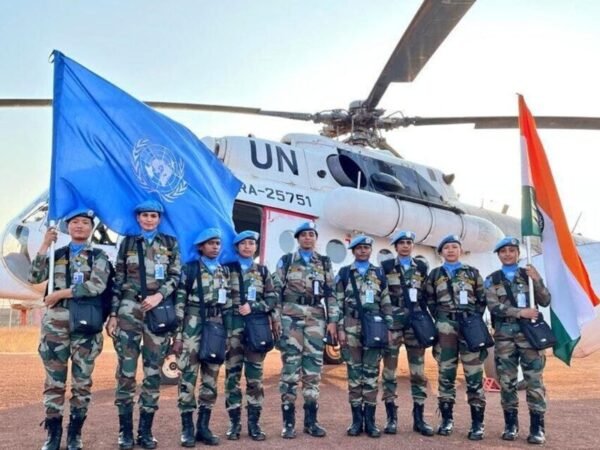India’s Pivotal Role in UN Peacekeeping

UN peacekeeping is an international effort aimed at maintaining peace and stability in conflict-ridden regions around the world. It involves sending military, police, and civilian personnel from UN member states to these areas with the goal of creating a secure environment, protecting civilians, and helping to facilitate the transition to peace. UN peacekeepers operate under the principles of impartiality, consent, and the non-use of force, except in self-defence. Their tasks include monitoring ceasefires, separating warring parties, promoting dialogue, providing humanitarian aid, and supporting the rebuilding of institutions. UN peacekeeping plays a crucial role in preventing the escalation of conflicts and saving lives.
India’s role in UN peacekeeping
India holds the distinction of being one of the founding members of the United Nations, which was established in 1945. Since then, India has emerged as one of the largest contributors to UN peacekeeping operations. Its journey as a peacekeeping contributor began in 1950, when it deployed its first contingent to the Korean War. This marked the beginning of India’s consistent dedication to peacekeeping efforts. Over the years, India has actively participated in numerous UN missions, deploying troops, police personnel, and experts to conflict zones around the world. The Indian peacekeepers have played a crucial role in monitoring ceasefires, protecting civilians, and facilitating the transition to peace in these areas.
Past Missions
As mentioned earlier, India has made significant contributions to various UN peacekeeping missions since 1950. In Korea (1950–54), India deployed a paramedical unit and a custodian force. In Indo-China (1954–70), India provided an infantry battalion for monitoring ceasefires and repatriating prisoners of war. India also contributed to the Middle East mission (1956–67), where armed troops were deployed for the first time. In Congo (1960–64), Indian infantry brigades and an IAF flight participated, with Captain GS Salaria receiving posthumously the Paramvir Chakra. India played a role in Cambodia (1992–93), Mozambique (1992–94), Somalia (1993–94), Rwanda (1994–96), Angola (1989–99), Sierra Leone (1999–2001), Ethiopia-Eritrea (2006–08), and more, deploying infantry battalions, engineering companies, and providing staff officers. These contributions demonstrate India’s commitment to international peacekeeping efforts.
Women in peacekeeping
India has a long-standing tradition of sending women to participate in UN peacekeeping missions. In a significant milestone, in April 2007, India became the first country to deploy an all-woman contingent to a UN mission in Liberia. This historic deployment showcased India’s commitment to gender equality and women’s empowerment in the realm of peacekeeping. Indian women peacekeepers have since played crucial roles in various missions, contributing to peace and security efforts on the ground. Their participation has not only brought diverse perspectives and skills but has also served as an inspiration for other women within their forces and beyond to consider peacekeeping as a viable option.
In 2020, Major Suman Gawani of the Indian Army won the prestigious UN Military Gender Advocate Award, becoming the first Indian peacekeeper to receive this recognition. Her exceptional work in promoting gender equality and advocating for the protection of women and children in conflict zones exemplifies the dedication of Indian women peacekeepers. Furthermore, India has taken a proactive step in promoting women’s participation in UN peacekeeping operations through the Indian ASEAN Initiative. This initiative aims to enhance the role of women from ASEAN countries in UN peacekeeping missions, fostering greater inclusivity and diversity in these operations.


















